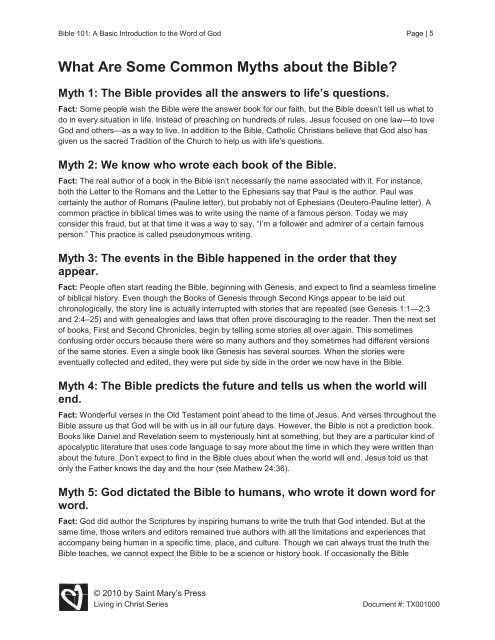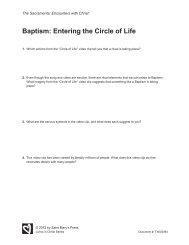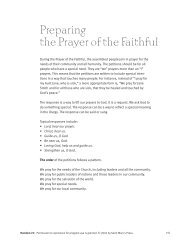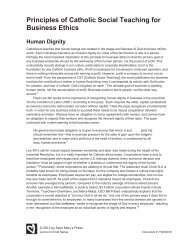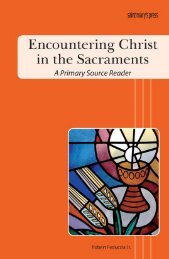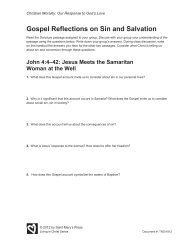Bible 101: A Basic Introduction to the Word of God - Saint Mary's Press
Bible 101: A Basic Introduction to the Word of God - Saint Mary's Press
Bible 101: A Basic Introduction to the Word of God - Saint Mary's Press
Create successful ePaper yourself
Turn your PDF publications into a flip-book with our unique Google optimized e-Paper software.
<strong>Bible</strong> <strong>101</strong>: A <strong>Basic</strong> <strong>Introduction</strong> <strong>to</strong> <strong>the</strong> <strong>Word</strong> <strong>of</strong> <strong>God</strong> Page | 5What Are Some Common Myths about <strong>the</strong> <strong>Bible</strong>?Myth 1: The <strong>Bible</strong> provides all <strong>the</strong> answers <strong>to</strong> life’s questions.Fact: Some people wish <strong>the</strong> <strong>Bible</strong> were <strong>the</strong> answer book for our faith, but <strong>the</strong> <strong>Bible</strong> doesn’t tell us what <strong>to</strong>do in every situation in life. Instead <strong>of</strong> preaching on hundreds <strong>of</strong> rules, Jesus focused on one law—<strong>to</strong> love<strong>God</strong> and o<strong>the</strong>rs—as a way <strong>to</strong> live. In addition <strong>to</strong> <strong>the</strong> <strong>Bible</strong>, Catholic Christians believe that <strong>God</strong> also hasgiven us <strong>the</strong> sacred Tradition <strong>of</strong> <strong>the</strong> Church <strong>to</strong> help us with life’s questions.Myth 2: We know who wrote each book <strong>of</strong> <strong>the</strong> <strong>Bible</strong>.Fact: The real author <strong>of</strong> a book in <strong>the</strong> <strong>Bible</strong> isn’t necessarily <strong>the</strong> name associated with it. For instance,both <strong>the</strong> Letter <strong>to</strong> <strong>the</strong> Romans and <strong>the</strong> Letter <strong>to</strong> <strong>the</strong> Ephesians say that Paul is <strong>the</strong> author. Paul wascertainly <strong>the</strong> author <strong>of</strong> Romans (Pauline letter), but probably not <strong>of</strong> Ephesians (Deutero-Pauline letter). Acommon practice in biblical times was <strong>to</strong> write using <strong>the</strong> name <strong>of</strong> a famous person. Today we mayconsider this fraud, but at that time it was a way <strong>to</strong> say, “I’m a follower and admirer <strong>of</strong> a certain famousperson.” This practice is called pseudonymous writing.Myth 3: The events in <strong>the</strong> <strong>Bible</strong> happened in <strong>the</strong> order that <strong>the</strong>yappear.Fact: People <strong>of</strong>ten start reading <strong>the</strong> <strong>Bible</strong>, beginning with Genesis, and expect <strong>to</strong> find a seamless timeline<strong>of</strong> biblical his<strong>to</strong>ry. Even though <strong>the</strong> Books <strong>of</strong> Genesis through Second Kings appear <strong>to</strong> be laid outchronologically, <strong>the</strong> s<strong>to</strong>ry line is actually interrupted with s<strong>to</strong>ries that are repeated (see Genesis 1:1—2:3and 2:4–25) and with genealogies and laws that <strong>of</strong>ten prove discouraging <strong>to</strong> <strong>the</strong> reader. Then <strong>the</strong> next se<strong>to</strong>f books, First and Second Chronicles, begin by telling some s<strong>to</strong>ries all over again. This sometimesconfusing order occurs because <strong>the</strong>re were so many authors and <strong>the</strong>y sometimes had different versions<strong>of</strong> <strong>the</strong> same s<strong>to</strong>ries. Even a single book like Genesis has several sources. When <strong>the</strong> s<strong>to</strong>ries wereeventually collected and edited, <strong>the</strong>y were put side by side in <strong>the</strong> order we now have in <strong>the</strong> <strong>Bible</strong>.Myth 4: The <strong>Bible</strong> predicts <strong>the</strong> future and tells us when <strong>the</strong> world willend.Fact: Wonderful verses in <strong>the</strong> Old Testament point ahead <strong>to</strong> <strong>the</strong> time <strong>of</strong> Jesus. And verses throughout <strong>the</strong><strong>Bible</strong> assure us that <strong>God</strong> will be with us in all our future days. However, <strong>the</strong> <strong>Bible</strong> is not a prediction book.Books like Daniel and Revelation seem <strong>to</strong> mysteriously hint at something, but <strong>the</strong>y are a particular kind <strong>of</strong>apocalyptic literature that uses code language <strong>to</strong> say more about <strong>the</strong> time in which <strong>the</strong>y were written thanabout <strong>the</strong> future. Don’t expect <strong>to</strong> find in <strong>the</strong> <strong>Bible</strong> clues about when <strong>the</strong> world will end. Jesus <strong>to</strong>ld us tha<strong>to</strong>nly <strong>the</strong> Fa<strong>the</strong>r knows <strong>the</strong> day and <strong>the</strong> hour (see Ma<strong>the</strong>w 24:36).Myth 5: <strong>God</strong> dictated <strong>the</strong> <strong>Bible</strong> <strong>to</strong> humans, who wrote it down word forword.Fact: <strong>God</strong> did author <strong>the</strong> Scriptures by inspiring humans <strong>to</strong> write <strong>the</strong> truth that <strong>God</strong> intended. But at <strong>the</strong>same time, those writers and edi<strong>to</strong>rs remained true authors with all <strong>the</strong> limitations and experiences thataccompany being human in a specific time, place, and culture. Though we can always trust <strong>the</strong> truth <strong>the</strong><strong>Bible</strong> teaches, we cannot expect <strong>the</strong> <strong>Bible</strong> <strong>to</strong> be a science or his<strong>to</strong>ry book. If occasionally <strong>the</strong> <strong>Bible</strong>© 2010 by <strong>Saint</strong> Mary’s <strong>Press</strong>Living in Christ SeriesDocument #: TX001000


